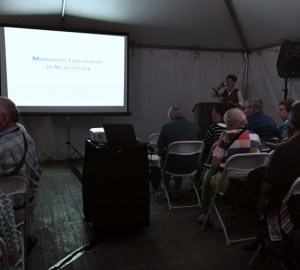I stumbled upon the surprise “hit” workshop today at the Mennonite World Conference. Teens and adults piled into Astrid von Schlachta’s seminar on how the German Mennonites reacted to “NS” (National Socialist/Nazi) government. She has done some new research.
The German Mennonites of the 1930’s, as it turns out, were enthused with Adolf Hitler, who seemed religious and, more importantly, seemed to be eager to include them in the greater life of the nation. As a people who had been excluded for so long, they were eager to be included after a long isolation. The Baptists and Methodists also had a similar reaction. Plus, many people thought Nazism was a lesser threat than Bolshevism.

Discussion was vigorous among those gathered. I was surprised, but I shouldn’t have been. Many U.S. Mennonites have German and Russian ancestors. Not only did they have grandparents who went through WW2; they still have not reconciled with the “enemy.” They have memories. Those memories have not been talked through. Seventy years after the war, this group of people seems to be getting to the place where someone can hear their stories. From the eagerness with which some spoke, it appeared that no one had asked them to talk much yet. The “quiet of the land” seem to have kept a lot of unseemly things quiet.
How about our own story?
I have experienced similar commitment to “keeping things quiet” when I have told my own story or asked about things that were supposed to stay hushed up among the Brethren in Christ. I am rarely accused of being untruthful or insincere, but I am often taken aside and told I am “rude.” I forget the cultural collusion that is often at work to keep what is horrible in its horrible box. Long after the monster has lost its fangs, the habit of keeping the lid on stuff is still at play. Anything that resembles the trauma gets a lid-banging treatment.
The historian asked our seminar what they thought should be done with her research. Several people stood up to tell stories and to encourage others to do the same; they need to be heard, not quieted. Some wanted reconciliation — like between the Dutch and German Mennonites, who could work jointly on the history project, not just nationally. One young man stood up and offered what I thought might be the best response. He said, “Stay radical.”
The longing of the 1930’s German Mennonites (and other minority religious groups) to be accepted by the world is what looks worst in hindsight. Every time the world accepts Christians into the mainstream, it snips off bits of what makes them distinctive. Christians, in general, not just the radical reformers, should take note. The New Testament has repeatedly warned that the things of the world will steal the heart of the gospel from us. Perhaps it will be incremental, but before long they will get to the core and our faith story will be at and end.
As Circle of Hope has been considering how to connect even better than we have, this has been a lively discussion among us, too. How do we use the tools and language of the people of our era without pandering so hard we end up exactly like them? Do we really want to be in the place where we beg people to accept us? Worse, do we want to be snuggled up in the world at the cost of our souls?